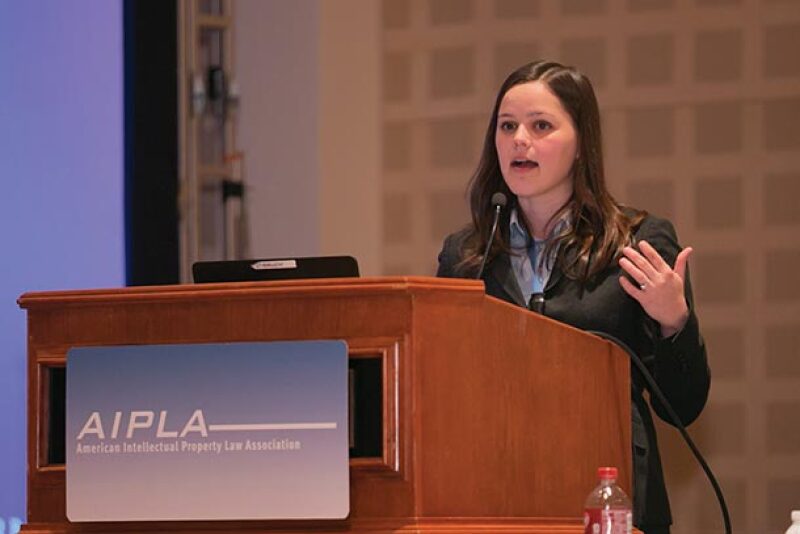
Alexandra Bistline of Pirkey Barber (pictured) discussed the effect of the B&B Hardware ruling in March of this year, which found that decisions by the TTAB can have a preclusive effect on subsequent Federal trademark infringement suits, “[s]o long as the other ordinary elements of issue preclusion are met” and “the usages adjudicated by the TTAB are materially the same as those before a district court.”
Bistline said this has left some uncertainty that will play out in the courts. “Unfortunately, there is a fair amount of ambiguity around what that standard means and how courts are suppose go implement it,” she said.
She explained the two biggest points of contention will be what “usages” and “materially the same” mean. “Moving forward there is likely to be a fair amount of litigation on these two points,” she said.
Another question is that the Supreme Court left open the possibility that sometimes the TTAB doesn’t provide a “full and fair opportunity to litigate.” The snag, said Bistline, is “they gave zero examples of when that might be, so litigants could make several arguments about why it wasn’t a fair and full opportunity.”
Another issue to watch is Justice Ginsburg’s concurrence in the case, noting the Court’s finding that “for a great many registration decisions issue preclusion obviously will not apply.” Justice Ginsburg noted in particular that “contested registrations are often decided upon ‘a comparison of the marks in the abstract and apart from their marketplace usage,’” and that preclusion would not apply in such cases.
Bistline said of the concurrence: “It’s only one paragraph long and it will likely be cited frequently. You will see a lot of people using that as a guide for the scope of the ruling and its impact moving forward.”
On the patent side, Jason Hoffman of BakerHostetler heralded the rise of the technical expert in claim construction as a result of recent Supreme Court rulings. The Federal Circuit’s Philips v AWH ruling in 2005 had led to not having experts provide opinions with respect to claim constructions.
But the Supreme court got involved with its Nautilus v Biosig ruling in 2014, holding that a patent’s claims, “read in light of the specification delineating the patent, and the prosecution history, fail to inform, with reasonable certainty, those skilled in the art about the scope of the invention.”
The Teva v Sandoz decision this year held that when reviewing a district court’s resolution of subsidiary factual matters made in the course of interpreting a patent claim, the Federal Circuit must apply a “clear error,” not a de novo, standard of review.
Hoffman said these decisions lay out the idea you should look to the experts. He said that the combination of Nautilus and Teva has opened the door for litigants to submit expert testimony in support of proposed claim constructions and for the expert testimony to be given more credence by the district court.
In addition, Teva gave some added protection to the factual conclusions made by a district court if it chooses to rely upon expert testimony, as such findings on review are now subject to the clearly erroneous standard.
“So all of a sudden the Supreme Court is pointing towards the experts,” he said. “As a result of this, the technical expert is back! It has basically become standard operating procedure this year to submit an expert.”









